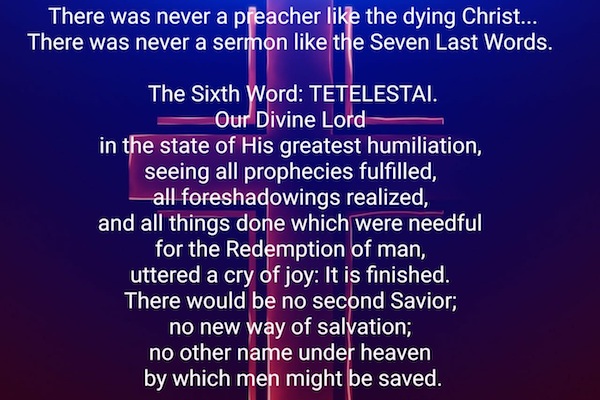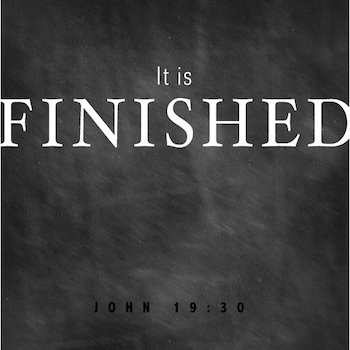LENT 2024: Day 37 - LIFE OF CHRIST

LENT 2024: DAY 37 - Wednesday March 27
“Our Lord spoke seven times from the Cross; these are called His Seven Last Words. In the Scriptures the dying words of only three others were recorded: Israel, Moses, and Stephen. The reason perhaps is that no others are found so significant and representative as these three. Israel was the first of the Israelites; Moses, the first of the legal dispensation; Stephen, the first Christian martyr. The dying words of each began something sublime in the history of God’s dealings with men.
In His goodness, Our Blessed Lord left His thoughts on dying, for He – more than Israel, more than Moses, more than Stephen – was representative of all humanity. In this sublime hour He called all His children to the pulpit of the Cross, and every word He said to them was set down for the purpose of an eternal publication and an undying consolation. There was never a preacher like the dying Christ; there was never a congregation like that which gathered about the pulpit of the Cross; there was never a sermon like the Seven Last Words.
The Sixth Word:
“From all eternity God willed to make men in the image of his Eternal Son. Having perfected and achieved this likeness in Adam, He placed him in a garden, beautiful as God alone knows how to make a garden beautiful. In some mysterious way the revolt of Lucifer echoed to earth, and the image of God in man became blurred. The heavenly Father now willed in His Divine mercy to restore man to his pristine glory, in order that fallen man might know the beautiful image to which he was destined to be conformed. God sent His Divine Son to this earth, not just to forgive sin but to satisfy justice through suffering.
In the beautiful Divine economy of Redemption, the same… things which cooperated in the Fall shared in Redemption. For the disobedient man Adam, there was the obedient new Adam, Christ… for the tree of the Garden, there was the tree of the Cross. Looking back on the Divine plan and after having tasted the vinegar which fulfilled the prophecy, He now uttered what in the original is only one word:
“It is finished.”
(John 19:30)

It was not an utterance of thanksgiving that His suffering was over and finished, thought the humiliation of the Son of Man was now at an end. It was rather that His life from the time of His birth to the tie of His death had faithfully achieved what the Heavenly Father sent Him to do.
Three times God used that same word in history: first, in Genesis, to describe the achievement or completion of creation; second, in the Apocalypse, when all creation would be done away with and a new heaven and earth would be made. Between these two extremes of the beginning and the accomplished end, there was the link of the sixth utterance from the Cross. Our Divine Lord in the state of His greatest humiliation, seeing all prophecies fulfilled, all foreshadowings realized, and all things done which were needful for the Redemption of man, uttered a cry of joy:
“It is finished.”
The life of the Spirit could now begin the work of sanctification, for the work of Redemption was completed. In creation on the seventh day, after the heavens and the earth were finished, God rested from all the work that He had done; now the Savior on the Cross having taught as Teacher, governed as King, and sanctified as Priest, could enter into His rest. There would be no second Savior; no new way of salvation; no other name under heaven by which men might be saved. Man had been bought and paid for.
Christ, one with the Eternal Father in the work of creation, had perfected Redemption. There was not a historic foretelling – from Abraham who offered in sacrifice his son, to Jonas who was in the belly of the whale for three days – which was not in Him fulfilled. The prophecy of Zacharias that He should make entrance into Jerusalem on an ass in humility; the prophecy of David that He should be betrayed by one of His own familiars; the prophecy of Zacharias that He should be sold for thirty pieces of silver, and that this price should afterwards be used to buy a field of blood; the prophecy of Isaias that He would be barbarously treated, scourged, and put to death; the prophecy of Isaias that he would be crucified between two malefactors, and that He would pray for His enemies; the prophecies of David that they would give Him vinegar to drink and divide His garments among them; that he would be a prophet like Moses, a priest like Melchisedech, a Lamb to be slain, a scapegoat driven out of the city; that He would be wiser than Solomon, more kingly than David, and that He should be the One to Whom Abraham and Moses looked in prophecy – all these wonderful hieroglyphics would have bee left unexplained, had no the Son of God Incarnate on His Cross looked back on all the sheep and goats and bullocks who were offered in sacrifice and said:
“It is finished.”
It was not after preaching the beautiful Sermon on the Mount that He said that His work was perfected. It was not to teach that He came; it was, as he said, to give His life as a ransom for many. On His way up to Jerusalem He had told His Apostles that He would be delivered to the Gentiles, would be mocked and spat upon, and would be scourged and put to death; in the garden when Peter lifted his sword, Christ asked if he should not drink the chalice that the Heavenly Father had given Him. At the age of twelve, the first time He spoke in Scripture, He said that He must be about the business of His Father. Now the work which the Father had given Him to do was finished. The Father had sent the Son in the likeness of sinful flesh and by the Eternal Spirit He was conceived in Mary’s womb. All this came to pass that He might suffer on the Cross. Thus reparation involved the whole Trinity. What was achieved was Redemption, as Peter himself would say after he received the Spirit, and understood the meaning of the Cross.
“What was the ransom that freed you from the vain observance of ancestral tradition? You know well enough that it was not paid in earthly currency, silver or gold; it was paid in the precious Blood of Christ; no lamb was ever so pure, so spotless a Victim.” (1 Peter 1: 18-19)

(Chapter 49, pgs. 812 – 815)
+ FRASES PARA LEER